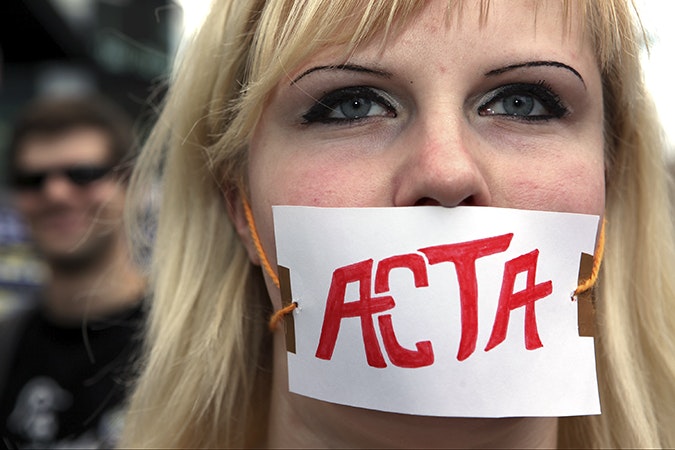In a Triumph for Democracy, European Parliament Says No to ACTA
By Vera Franz & Els Torreele

The Anti-Counterfeit Trade Agreement (ACTA) is a far-reaching and secretly negotiated international trade agreement that would enforce intellectual property rights and punish infringements in a way that threatens to undermine freedom of expression and privacy online, due process, access to medicines, and the sharing of knowledge online.
In a time when Europeans are losing faith in politicians and political institutions, the vote on the fourth of July by the European Parliament against ACTA helps to restore some of this trust. The Parliament has clearly listened to its voters: 478 Members of Parliament voted against the agreement, 39 in favour.
This is a major victory for civil society, internet activism, and democracy, and important for several reasons.
- The European Parliament can no longer be viewed as an accessory to the other European Union institutions. This is the first time the Parliament has rejected an international agreement already approved by the European Commission.
- Brussels is embarking on a review of its Intellectual Property Enforcement Directive. The ACTA campaign and what it has done to educate policy makers about their voters’ concerns with aggressive enforcement proposals will have ripple effects on the review of its Intellectual Property Enforcement Directive and other European enforcement proposals.
- With the rejection of ACTA, it has again been made clear how these enforcement measures would give an unfair advantage to patented medicines—and restricted access to affordable generic medicines—to the detriment of patients and treatment providers alike.
- The European Commission should now review similarly harmful intellectual property provisions being pursued in other agreements, including its free trade negotiations such as the one under negotiation with India.
- This week’s vote against ACTA will open up a space for debate about the future of copyright. What do we want instead of ACTA? There are lots of ideas out there—the reintroduction of registration of copyright, creation of a competitive pan-European licensing system, or stronger limitations and exceptions for example. Some argue for legalizing non-commercial sharing of works online in return for the creation of new, internet-compatible financing models for cultural assets like books and music. Policy makers will need to join this debate about the future of copyright with an open mind and resist the influence of lobbyists with the deepest pockets.
- The ACTA outcome may well resonate in the ongoing negotiations for a Trans-Pacific Partnership agreement the United States is spearheading. The Trans-Pacific Partnership is another international trade agreement with high intellectual property rights enforcement ambitions. The latest round of talks on the Trans-Pacific Partnership are being held this week in San Diego in the United States.
- A key factor in the resistance to ACTA was the closed-door way in which the talks were held only allowing public scrutiny after the deal was done. While the Trans-Pacific Partnership is following a similar path, it is clear that citizens and elected representatives alike will no longer accept being sidelined by “special interest” secrecy.
While badly damaged, ACTA is not dead outside Europe. More work needs to be done on the copyright reform debate as well as to safeguard access to medicines.
A recent decision on orphan works—books, newspaper and magazine articles, and films that are still protected by copyright but whose authors are not known or cannot be located or contacted to obtain copyright permissions—is a reminder of how much remains to be done. Orphan works are part of the collections held by European libraries that might remain untouched if no common rules are developed to make their digitization and online display legally possible. The recent compromise text for the European Commission Orphan Works Directive was widely seen to fall significantly short of the Directive’s aim to facilitate mass or large-scale digitization of Europe’s cultural and educational heritage and will in reality be useful only for niche-purpose, small-scale digitizations.
However, for now, it’s time to congratulate all those NGOs, our partners, and talented individuals who have worked tirelessly on the campaign against ACTA. This week’s decisive vote by the European Parliament against ACTA is an example of the impact the collective action of civil society and internet activism can have against seemingly insurmountable forces.
Vera Franz is division director of Expression for Global Programs at the Open Society Foundations.
Until January 2017, Els Torreele was director for the access and accountability activities of the Open Society Public Health Program.


